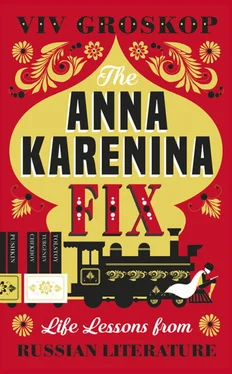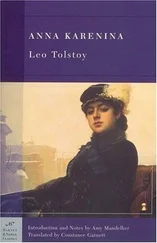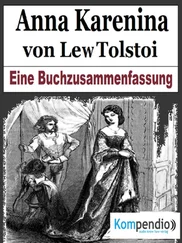Viv Groskop - The Anna Karenina Fix - Life Lessons from Russian Literature
Здесь есть возможность читать онлайн «Viv Groskop - The Anna Karenina Fix - Life Lessons from Russian Literature» весь текст электронной книги совершенно бесплатно (целиком полную версию без сокращений). В некоторых случаях можно слушать аудио, скачать через торрент в формате fb2 и присутствует краткое содержание. Город: London, Год выпуска: 2017, ISBN: 2017, Издательство: Fig Tree, Жанр: Публицистика, Критика, на английском языке. Описание произведения, (предисловие) а так же отзывы посетителей доступны на портале библиотеки ЛибКат.
- Название:The Anna Karenina Fix: Life Lessons from Russian Literature
- Автор:
- Издательство:Fig Tree
- Жанр:
- Год:2017
- Город:London
- ISBN:978-0-241-98126-9
- Рейтинг книги:3 / 5. Голосов: 1
-
Избранное:Добавить в избранное
- Отзывы:
-
Ваша оценка:
- 60
- 1
- 2
- 3
- 4
- 5
The Anna Karenina Fix: Life Lessons from Russian Literature: краткое содержание, описание и аннотация
Предлагаем к чтению аннотацию, описание, краткое содержание или предисловие (зависит от того, что написал сам автор книги «The Anna Karenina Fix: Life Lessons from Russian Literature»). Если вы не нашли необходимую информацию о книге — напишите в комментариях, мы постараемся отыскать её.
‘A passionate, hilarious, joyful love letter to Russian literature’ Allison Pearson, Sunday Telegraph
‘A delightful primer and companion to all the authors you are ashamed to admit you haven’t read’ The Times
The Anna Karenina Fix: Life Lessons from Russian Literature — читать онлайн бесплатно полную книгу (весь текст) целиком
Ниже представлен текст книги, разбитый по страницам. Система сохранения места последней прочитанной страницы, позволяет с удобством читать онлайн бесплатно книгу «The Anna Karenina Fix: Life Lessons from Russian Literature», без необходимости каждый раз заново искать на чём Вы остановились. Поставьте закладку, и сможете в любой момент перейти на страницу, на которой закончили чтение.
Интервал:
Закладка:
Viv Groskop
THE ANNA KARENINA FIX
Life Lessons from Russian Literature
A Note on Sources, Translation, Transliteration and Those Funny Russian Names
However much anyone loves Russian literature, it’s easy to see that, generally speaking, from the outside, it is hugely off-putting. First, there’s the issue of translation. How do you know which translation to choose? If you’re struggling to get through a book, is it the fault of the author or of the translator? Or – God forbid! – of you, the reader? And in any case, even if it is a very good translation, isn’t every translation a betrayal of the original? What if it’s too good a translation and all the original meaning has been stripped out and anglicized? You’ll never read it like a Russian would read it, so what’s the point?
These are the kinds of arguments that usually go through someone’s mind when approaching the entity people used to call ‘the Russians’ (meaning ‘the great Russian classics’). They’re the reason there’s a photograph which surfaces on the internet from time to time which depicts a bookshelf proudly showcasing a much-loved copy of Anna Karenina . Squashed between other books on the shelf, the spine of the book is bent out of shape an eighth of the way across. The rest of it is pristine and untouched. The picture says it all. This is a book lots of people start (and restart, often many times) but not everyone finishes. But it’s also a book no one ever quite gives up on. It’s still sitting there, hopefully, on the shelf, waiting for someone to get past the first hundred pages. We all have books like that, books whose spine we hope to crack all the way across one day.
The reputation that accompanies ‘the Russians’ is fearsome. ‘They’re deep.’ ‘They’re difficult.’ ‘They’re self-contradicting.’ ‘You’ll never understand X if you haven’t read Y.’ And on and on. I hate this kind of talk and find it reductive and insular. All literature should be for everyone, no matter how obscure and no matter how supposedly imperfect the translation. When it comes to translation, although I do love long-suffering translators everywhere and see them as the unsung heroes of the modern world, I am not a translation nerd and I don’t insist on special favourites. I tend to think that if someone has spent the best part of four or five years translating War and Peace (and has been paid by a publisher to do so), they’ve probably done a pretty good job and there’s no point in splitting hairs about whether someone else’s job is marginally better. So I just tend to go for the editions of the book that seem to be the most popular or the most recent. I think life is too short to get any more specialized than that. That said, I’ve tried to pick editions of the books in question here which are easy to get hold of and are generally accepted by people who care deeply about these things as the most readable – or ‘best’ – translations.
I do sympathize with people’s strongly held feelings about translation. As Anthony Briggs writes in his foreword to his translation of War and Peace , over time, colloquial language changes and things that once seemed normal suddenly read oddly. Personally, I find this rather charming and wouldn’t seek to eliminate it. But Briggs makes the point that in a decent translation you try to get rid of any howlers: ‘Infelicities will be edited out, such as “Andrei spent the evening with a few gay friends”, “Natasha went about the house flushing”, “he exposed himself on the parade ground” or “he ejaculated with a grimace”; we cannot read phrases like these without raising an inappropriate smile.’ Ah, but we want some inappropriate smiles! Nonetheless I get it. I get it. No gay privates allowed on parade.
It’s as well to assume when reading this book that I am talking about (and quoting from) the translations of the books referred to in the Recommended Reading list at the back. I did my undergraduate degree in Russian in the early 1990s and a postgrad degree ten years later. Back then, I could breeze through a book about Soviet constructivism in Russian, just for fun. (Admittedly, it was about as much fun as it sounds.) So, at some point or another, I have read most of these books in the original language. And where I haven’t read them entirely in the original, I have tried bloody hard to give it a go. But a lot of this reading was when I lived in Russia for a year twenty years ago. Nowadays, I don’t sit around reading War and Peace in Russian. I could have created a huge challenge for myself, gone to live in a cave with some large dictionaries and based everything here on my own translations from the originals. But I thought that would undermine the point I most want to make: that these books are for everyone, not just the special few who have mastered the language. Plus, I love reading literature in translation. You read differently in your own language. I don’t think you ever read quite as naturally in another language, no matter how well you acquire it. This is a long-winded way of saying: very few of the translations in this book are mine. (Although if something has been translated wrongly, it’s almost definitely me.)
The transliteration in this book is also not mine. Transliteration is a tiresome but necessary phenomenon that I did not come across until I learned Russian. It is the business of transposing Russian (the Cyrillic alphabet) into English (the Latin alphabet). Where I’ve quoted from a book, both the translation of the Russian and the transliteration of any Russian words come from the editions mentioned in the Recommended Reading. If I have saved myself years of research by not translating anything myself, I have possibly saved even more by not doing the transliterating. I especially hate transliterating.
Over the years, different systems of transliteration have emerged, which is why you sometimes see Chekhov written as ‘Tchekov’ or Dostoevsky written as ‘Dostoyevskii’. None of these different spellings is inherently wrong, but there’s an accepted system of transliteration and you are supposed to follow it. Russian and English have many letters and sounds in common. But they also have letters that are incompatible. So, for example, there are single letters in the Russian alphabet for the sound ‘ch’ and the sound ‘shch’. (Yes, these are different sounds.) There is a variation on the letter T (and other consonants) which involves softening that letter with a ‘soft sign’, represented by an apostrophe in transliteration. And there are several extra vowels in Russian, including a vowel that we don’t have in English that is pronounced ‘you’ and a vowel sound we don’t have that is pronounced as something between ‘ee’ and ‘oi’. I can see why you need an agreed system. But I have never been able to master it. So, if there are any transliteration mistakes, they’re all mine, too.
Finally, on top of the competing translations, the confusing transliterations and all those feelings of intellectual insecurity which swirl around any time we talk about Russian literature, there is the undeniable business of the names. I once met a Danish academic who was incredibly intelligent and well read and had himself, in one of his books, prescribed reading War and Peace for the purposes of intense relaxation. When I praised him for this excellent recommendation, he adopted a pained expression and said, ‘Ah, yes, Russian literature is wonderful. But the names! The names! Why do they all have to have forty-seven names?’
He’s right, of course, although usually for a character to have more than three or four names would be unusual. It just feels like forty-seven. What derails non-Russians is the use of the patronymic, by which I mean the second bit of Ivan Ivanovich. Really, though, this is very easy to understand, and the more you read patronymics, the more you get used to them and learn to ignore them, as they’re not really that useful. In spoken speech, it’s polite to use them, but they’re almost thrown away and half swallowed.
Читать дальшеИнтервал:
Закладка:
Похожие книги на «The Anna Karenina Fix: Life Lessons from Russian Literature»
Представляем Вашему вниманию похожие книги на «The Anna Karenina Fix: Life Lessons from Russian Literature» списком для выбора. Мы отобрали схожую по названию и смыслу литературу в надежде предоставить читателям больше вариантов отыскать новые, интересные, ещё непрочитанные произведения.
Обсуждение, отзывы о книге «The Anna Karenina Fix: Life Lessons from Russian Literature» и просто собственные мнения читателей. Оставьте ваши комментарии, напишите, что Вы думаете о произведении, его смысле или главных героях. Укажите что конкретно понравилось, а что нет, и почему Вы так считаете.












